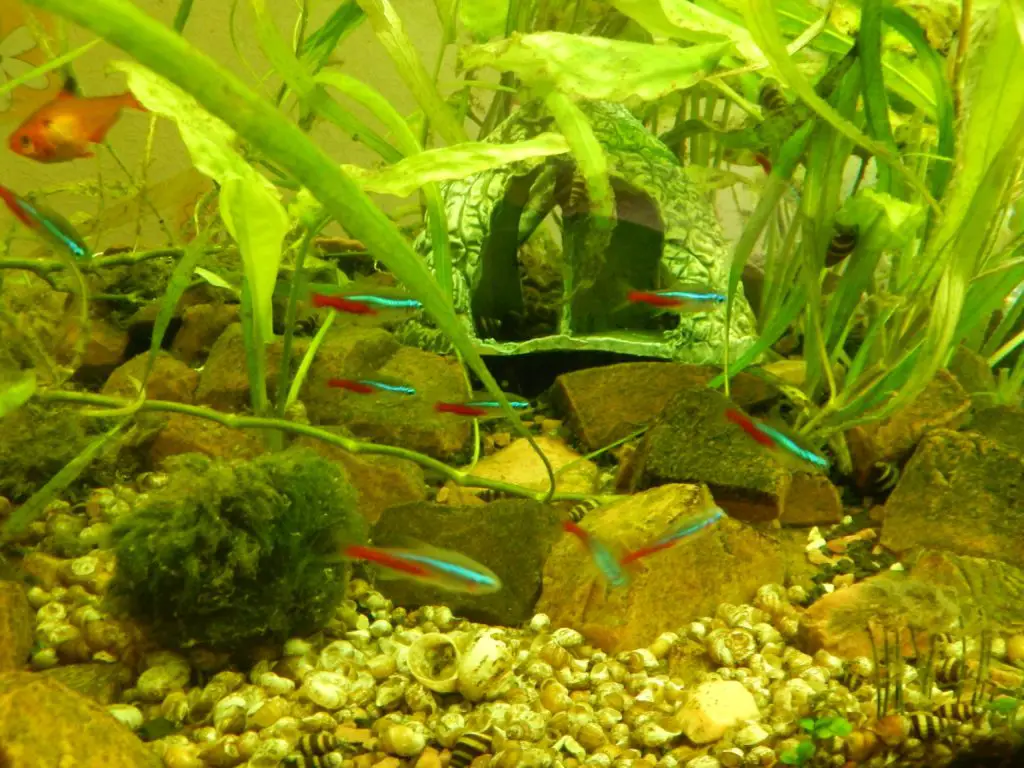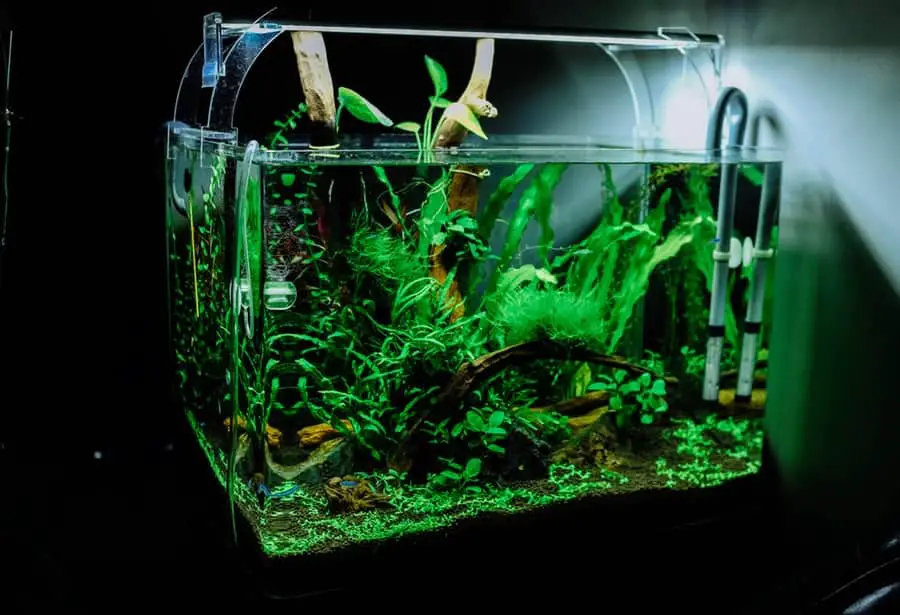If you’re a betta fish owner, you may have heard conflicting opinions on whether or not algae is bad for your fish. While some may say it’s harmless, others claim it can cause serious health issues. So, is algae really bad for betta fish? Let’s dive into the topic and explore the potential risks and benefits of algae in your betta fish‘s tank.
Algae is a natural occurrence in aquariums and can provide a source of food for certain types of fish. However, too much algae can lead to problems such as reduced oxygen levels, increased ammonia levels, and algae blooms that can harm your fish. Understanding the relationship between algae and betta fish is crucial for maintaining a healthy and thriving aquatic environment.
Is Algae Bad for Betta Fish?
Algae growth in a betta fish tank is normal and can even be beneficial for betta fish. However, excessive algae growth can deplete oxygen levels in the water and cause harm to the fish. Algae can also make the tank look unappealing and dirty. Therefore, it is important to maintain a balance of algae growth in the tank to ensure a healthy environment for your betta fish.

Is Algae Bad for Betta Fish?
As a betta fish owner, you want to provide the best possible environment for your little aquatic friend. One of the common concerns that may arise is whether algae is harmful to betta fish. Algae is a natural occurrence in an aquarium, but too much of it can cause problems. In this article, we will explore whether algae is bad for betta fish and what you can do to prevent it.
What is Algae?
Algae are aquatic plants that thrive in water with the right nutrients and light. They come in various colors, from green to brown, and can grow on different surfaces, such as rocks, gravel, and glass. Algae can also grow on live plants, which can be beneficial for aquariums as they can help absorb excess nutrients. However, too much algae can be harmful to the aquarium’s ecosystem and its inhabitants.
Algae can grow rapidly, especially in aquariums with too much light and nutrients. If not controlled, it can cover surfaces, obstructing light and oxygen from reaching other organisms in the aquarium. As a result, it can cause oxygen depletion, which can be harmful to betta fish.
The Effects of Algae on Betta Fish
Algae can have several negative effects on betta fish, including:
1. Reduced Oxygen Levels
As mentioned earlier, algae can obstruct light and oxygen from reaching other organisms in the aquarium. This can cause oxygen depletion, which can be fatal to betta fish.
2. Poor Water Quality
Excess algae can cause poor water quality, leading to high levels of ammonia, nitrites, and nitrates. These substances can be toxic to betta fish and can cause health problems, such as fin rot and swim bladder disease.
3. Blocked Gills
Algae can also block betta fish’s gills, making it difficult for them to breathe. This can cause stress, which can weaken their immune system and make them more susceptible to diseases.
Preventing Algae Growth in Betta Fish Tanks
Prevention is better than cure when it comes to algae growth in betta fish tanks. Here are some tips on how to prevent algae growth:
1. Reduce Light Exposure
Algae thrive in light, so reducing light exposure can slow down its growth. You can do this by reducing the amount of time your aquarium light is on or by using a light timer.
2. Reduce Nutrient Levels
Algae feed on excess nutrients in the water, such as phosphate and nitrate. You can reduce these levels by not overfeeding your betta fish and performing regular water changes.
3. Clean the Tank Regularly
Regular tank cleaning can help prevent algae growth. You can clean the tank by scrubbing off algae from surfaces, cleaning the substrate, and removing any dead plants or fish.
4. Add Algae-Eating Fish or Shrimp
Adding algae-eating fish or shrimp can help control algae growth in your tank. Some examples of algae-eating fish include Siamese algae eaters, Otocinclus catfish, and plecos.
Conclusion: Is Algae Bad for Betta Fish?
In conclusion, algae can be harmful to betta fish if it grows out of control. It can cause reduced oxygen levels, poor water quality, and blocked gills. However, with proper prevention measures, such as reducing light exposure, nutrient levels, and regular tank cleaning, you can prevent algae growth and keep your betta fish healthy. Adding algae-eating fish or shrimp can also help control algae growth.
Frequently Asked Questions
In the world of betta fish keeping, one of the most common topics is algae. Many fish keepers wonder if algae is bad for their bettas. In this article, we’ll answer some of the most frequently asked questions about algae and betta fish.
Is algae bad for betta fish?
Algae can be both good and bad for betta fish. In small amounts, algae can be a great source of food for bettas. However, if there is an overgrowth of algae in the tank, it can cause problems. An overgrowth of algae can lead to a decrease in oxygen levels, an increase in ammonia levels, and even the growth of harmful bacteria. In addition, too much algae can make it difficult for bettas to swim and may even block the filter intake.
It’s important to maintain a balance when it comes to algae in your betta fish tank. A small amount of algae is beneficial, but too much can be harmful. You can prevent overgrowth by performing regular water changes, cleaning the tank and filter, and controlling the amount of light your tank receives.
How does algae affect the water quality in a betta fish tank?
Algae can have a significant impact on the water quality in a betta fish tank. As algae grow, they use up oxygen and release carbon dioxide, which can lead to a decrease in oxygen levels in the tank. This can be harmful to betta fish, as they need oxygen to survive. In addition, as algae die, they can release ammonia into the water, which can be toxic to bettas. An overgrowth of algae can also make it difficult for the filter to keep up with the waste produced by bettas, leading to a buildup of harmful bacteria.
To prevent algae from negatively impacting the water quality in your betta fish tank, it’s important to maintain a balance. Regular water changes, cleaning the tank and filter, and controlling the amount of light your tank receives can all help prevent overgrowth and maintain a healthy environment for your betta fish.
Can algae cause health problems for betta fish?
An overgrowth of algae in a betta fish tank can cause health problems for bettas. Algae can block the filter intake, making it difficult for the filter to keep up with the waste produced by bettas. This can lead to a buildup of harmful bacteria in the tank, which can cause health problems for bettas. In addition, an overgrowth of algae can make it difficult for bettas to swim and may even cause them to become stressed.
To prevent health problems caused by algae, it’s important to maintain a balance. Regular water changes, cleaning the tank and filter, and controlling the amount of light your tank receives can all help prevent overgrowth and maintain a healthy environment for your betta fish.
What are some ways to prevent algae overgrowth in a betta fish tank?
There are several ways to prevent algae overgrowth in a betta fish tank. First, it’s important to control the amount of light your tank receives. Algae thrive in bright light, so it’s important to limit the amount of time your tank is exposed to direct sunlight or artificial light. Second, you can perform regular water changes to remove excess nutrients that can contribute to algae growth. Third, you can clean the tank and filter regularly to remove any excess waste or debris that can contribute to algae growth.
Finally, you can add live plants to your tank. Live plants can help absorb excess nutrients that can contribute to algae growth. In addition, they can help oxygenate the water and provide a natural habitat for your betta fish.
Can algae be beneficial for betta fish?
Algae can be beneficial for betta fish in small amounts. Algae are a great source of food for bettas and can provide them with essential nutrients. In addition, algae can help oxygenate the water in the tank, which is important for bettas to breathe. Finally, algae can provide a natural habitat for bettas, as they may enjoy swimming and hiding among the plants.
However, it’s important to maintain a balance when it comes to algae in your betta fish tank. Too much algae can be harmful and lead to a decrease in oxygen levels, an increase in ammonia levels, and the growth of harmful bacteria. To ensure that your bettas are healthy and happy, it’s important to control the amount of algae in your tank and maintain a healthy environment.

these beautiful fish will EAT ALGAE from my BETTA TANK
In conclusion, the answer to whether algae is bad for betta fish is not straightforward. While some types of algae can be beneficial for betta fish, others can be harmful. It is essential for betta fish owners to keep their tanks clean and maintain a proper balance of nutrients to avoid algae overgrowth.
Furthermore, betta fish owners should be aware of the type of algae growing in their tanks and take appropriate measures to control it. Regular water changes, proper filtration, and the use of algae-eating fish and snails can help keep algae growth in check.
Ultimately, it is up to betta fish owners to ensure their fish live in a healthy and safe environment free from harmful algae. With proper care and attention, betta fish can thrive in a tank with the right balance of nutrients and algae growth.
